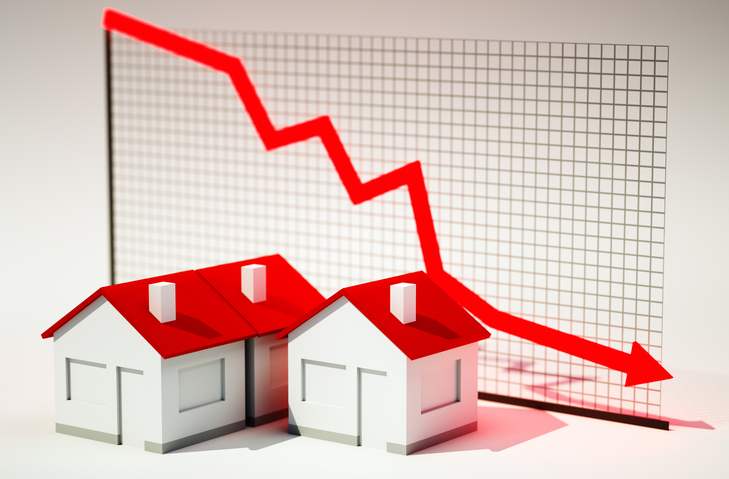Blog
Pittsburgh Weekly Mortgage Demand Takes a 10% Hit – How This Impacts Homebuyers and Sellers

Introduction
The latest reports indicate a surprising 10% decline in Pittsburgh mortgage demand over the past week. This sudden shift in mortgage application volume has caught the attention of both potential buyers and home sellers in the area. But what does this downturn really mean for the local housing market? And how should Pittsburgh homeowners looking to sell respond to this change?
In this detailed guide, we’ll explore the reasons behind the drop in mortgage demand, analyze the potential effects on home prices and buyer activity, and discuss strategic steps sellers can take to position themselves successfully in this changing landscape. Whether you’re thinking about selling your home now or considering waiting, understanding the current dynamics of Pittsburgh mortgage demand is crucial. At the same time, many buyers are weighing whether to buy now or wait for mortgage rates to decrease, as current market conditions and interest rates play a significant role in this decision.

Current State of the Pittsburgh Housing Market
The Pittsburgh housing market in 2024 continues to demonstrate resilience, even as national trends point toward cooling activity. According to recent data from the National Association of Realtors and local realtors in PA, Pittsburgh remains one of the more affordable metropolitan areas in the country, with median home prices still well below the national average. However, the pace of price growth has slowed compared to last year, reflecting the impact of higher mortgage rates and shifting buyer sentiment.
Inventory remains tight, with the number of homes for sale in Pittsburgh hovering near historic lows. This limited supply has helped support home values, even as buyer demand has softened. Properties in desirable neighborhoods or those that are move-in ready continue to attract attention, though homes are generally spending more time on the market than they did during the peak of the real estate boom.
The balance between buyers and sellers is gradually shifting. While it’s no longer the frenzied seller’s market of previous years, Pittsburgh has not fully transitioned to a buyer’s market. Instead, the market is moving toward a more balanced state, where both parties have opportunities to negotiate. Appraisals are coming in closer to contract prices, and bidding wars are less common, but well-priced homes still sell relatively quickly.
Local economists and realtors note that Pittsburgh’s strong employment base in healthcare, education, and technology continues to attract new residents, supporting steady demand for housing. As a result, the Pittsburgh housing market is expected to remain stable, with gradual adjustments in pricing and activity as the year progresses.
Understanding the Decline in Pittsburgh Mortgage Demand
Mortgage demand in Pittsburgh has dipped by 10% in just one week, primarily driven by rising interest rates and increasing economic uncertainty. Nationally, average mortgage rates have edged above 7%, the highest seen in years, and Pittsburgh is not immune to this trend. As borrowing becomes more expensive, many buyers are pausing their home search or reevaluating their financial readiness to purchase a property.
In Pittsburgh specifically, concerns about inflation, job market stability, and future rate hikes are contributing factors causing potential buyers to hesitate. As rates climb, the monthly payment on a home loan rises significantly, shrinking the pool of qualified buyers and slowing demand.
Another reason for the drop in Pittsburgh mortgage demand is seasonality. While spring and early summer traditionally mark the peak homebuying season, the latter half of summer often sees a natural cooling in buyer activity. Combined with economic headwinds, this seasonal dip is even more pronounced this year. The demand for home loans, including both purchase and refinance applications, is also affected by these seasonal and economic factors.

Factors Influencing Mortgage Demand
Several key factors are shaping mortgage demand in Pittsburgh right now, creating a complex environment for both homebuyers and sellers. While rising mortgage rates—especially the 30 year fixed rate, which recently surpassed 7% according to Freddie Mac—are a primary driver, they are far from the only influence.
Inflation remains a significant concern, impacting consumer spending and overall affordability. As the cost of living rises, many potential buyers are finding it more challenging to save for down payments or qualify for larger home loans. This has led to a decrease in the average loan size, as reported by the Mortgage Bankers Association, and a greater reliance on government loans and conventional financing options.
Lending standards have also tightened, with commercial banks and mortgage bankers scrutinizing applications more closely. Higher rates and stricter appraisals mean that some buyers are unable to secure the financing they need, further reducing the pool of qualified purchasers. At the same time, the number of refinances has dropped sharply, as current homeowners are less inclined to trade in their existing low-rate mortgages for higher rates.
Economic uncertainty, including concerns about tariffs, job stability, and the broader state of the economy, is causing some buyers to delay their purchase decisions. Data from national and local sources suggest that people are taking a more cautious approach, waiting to see if rates will stabilize or if home prices will adjust further.
Finally, government policies and programs—such as changes to FHA loan limits or new incentives for first-time buyers—can also influence demand. As the market adapts to these evolving factors, both buyers and sellers in Pittsburgh need to stay informed and flexible, working closely with experienced realtors and mortgage professionals to navigate the current landscape.
How Lower Mortgage Demand Affects Pittsburgh Home Sellers
For homeowners considering listing their property, the decline in Pittsburgh mortgage demand might seem alarming. Fewer mortgage applications often signal a slowdown in buyer competition, which could lead to longer selling times or even price reductions if the trend persists. However, understanding the nuances of the market can help sellers navigate these challenges effectively.
While buyer demand is slowing, Pittsburgh’s housing inventory remains relatively tight. This supply shortage can help stabilize prices, preventing a sudden drop even amid reduced demand. Homes in sought-after neighborhoods or in move-in-ready condition still attract serious buyers, especially those less sensitive to interest rate increases.
However, sellers should be prepared for fewer bidding wars and more cautious buyers. Pricing your home correctly becomes more important than ever. Overpricing in this environment may cause a listing to sit on the market, prompting potential price cuts later.
Additionally, strategic staging, professional photography, and flexible showing schedules can help your property stand out to the remaining active buyers. Working with an experienced local real estate agent who understands Pittsburgh’s shifting market trends is invaluable during periods of lower Pittsburgh mortgage demand.
The Relationship Between Mortgage Rates and Home Values in Pittsburgh
One question many homeowners have during times of declining mortgage demand is whether home prices in Pittsburgh are expected to fall. Historically, rising mortgage rates exert downward pressure on home prices because buyers’ purchasing power diminishes. Yet, Pittsburgh’s housing market has unique characteristics that can temper this impact.
Pittsburgh has consistently ranked as one of the more affordable metropolitan areas in the United States. The city’s real estate market didn’t experience the same explosive price growth seen in cities like Austin, San Francisco, or Seattle during the last housing boom. This moderation acts as a buffer, making Pittsburgh less vulnerable to drastic price corrections.
However, sellers should expect that appreciation will likely slow. Properties might still sell near asking price, but fewer buyers will stretch their budgets to submit aggressive offers. If rates remain high for an extended period, Pittsburgh could shift from a seller’s market toward a more balanced environment, where buyers have more negotiating power.
Why Sellers Should Act Now, Not Later
In light of the current decline in Pittsburgh mortgage demand, some homeowners may be tempted to delay listing their property, hoping for lower rates and more buyer activity later. However, this approach carries its own risks. Waiting for mortgage rates to drop could take many months, if not years, depending on Federal Reserve policy and broader economic factors.
As more sellers adopt a “wait and see” approach, those who choose to list now could benefit from reduced competition in the housing supply. Selling during a period of limited listings can help capture the attention of the serious buyers who remain active, despite higher rates.
Additionally, economic uncertainty can worsen, leading to further decreases in buyer confidence. Listing sooner rather than later can help sellers capitalize on the remaining momentum in Pittsburgh’s housing market before conditions become more challenging.

How Home Sellers Can Strategically Respond
Adapting to a declining Pittsburgh mortgage demand environment means being proactive and strategic. Sellers should focus on the three P’s: pricing, presentation, and promotion.
Competitive pricing is critical. Buyers today are more sensitive to overpricing than they were during the low-rate boom. Working with a knowledgeable agent to set a realistic asking price based on recent comparable sales will help generate interest and avoid long listing periods.
Next, presentation matters more than ever. Professional staging, decluttering, and ensuring necessary repairs are completed can make your property more appealing to cautious buyers. Highlighting features like energy-efficient windows, updated kitchens, or modern appliances can also attract buyers trying to maximize value.
Finally, marketing your home effectively can help offset the reduced demand. High-quality photos, virtual tours, and targeted digital advertising can expand your home’s visibility to a wider audience, including relocation buyers or investors who may not be as rate-sensitive as typical buyers.
What the Future Holds for Pittsburgh Mortgage Demand
Looking ahead, Pittsburgh mortgage demand will largely depend on national economic indicators, mortgage rate trends, and local employment conditions. If inflation eases and the Federal Reserve slows or halts rate hikes, mortgage rates could stabilize or even decline, potentially reigniting buyer interest.
From January to June, mortgage rates have experienced notable fluctuations, with some months seeing higher rates that impacted affordability and slowed market activity. In June, recent housing market data showed changes in median sale prices and sales volume, reflecting how buyers and sellers are responding to these shifts.
However, economic slowdowns or further uncertainty could keep demand subdued into the fall and winter seasons. Sellers should monitor these trends and consult with real estate professionals to remain informed and ready to adjust their selling strategy as conditions evolve. If rates decline, refinance activity could increase, further impacting overall demand for mortgage products.
It’s also important to remember that Pittsburgh’s real estate market has historically shown resilience during broader downturns. The city’s strong healthcare, education, and tech sectors continue to support employment and attract new residents, which helps sustain housing demand over the long term.
Conclusion
The 10% weekly drop in Pittsburgh mortgage demand signals an important shift that home sellers should not ignore. While the market is cooling compared to earlier this year, opportunities still exist for sellers who act strategically. Rather than waiting for perfect conditions, homeowners can position themselves for success by setting competitive prices, preparing their homes for market, and working with agents who understand Pittsburgh’s unique housing dynamics.
The key takeaway for sellers is clear: while fewer buyers are in the market, those actively searching are serious and motivated. Catering to these buyers through smart pricing and strong marketing can lead to a successful sale even in the face of declining demand.
In the ever-changing world of real estate, knowledge is power. By staying informed about Pittsburgh mortgage demand trends and making informed decisions, sellers can navigate this shifting market with confidence and clarity.
Whether you’re ready to list your home today or just beginning to consider a sale, understanding the impact of mortgage demand changes will help you move forward wisely. Connect with a local real estate expert to assess your options and develop a personalized selling strategy that aligns with current market conditions.
Related articles
Let Us Make this Easier for You.
You don’t have to figure it all out today. We’re here to help you take the next step. No pressure. Just real help when you need it most.
"*" indicates required fields






